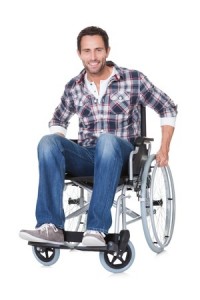Disabled people have every right to be employed. The employers have no right to discriminate or shun the employment opportunities just because the person is disabled. The employees with disabilities share the same general employment rights as other able workers do.
 The legislation in UK has passed Disability Discrimination Act according to which there are special provisions for disabled people. According to the Act, it is unlawful for the employers to discriminate people on the basis of their disabilities in all employment aspects unless it can be justified. Disabled people have employment rights too. The following recruitment and selection things are covered by the Act:
The legislation in UK has passed Disability Discrimination Act according to which there are special provisions for disabled people. According to the Act, it is unlawful for the employers to discriminate people on the basis of their disabilities in all employment aspects unless it can be justified. Disabled people have employment rights too. The following recruitment and selection things are covered by the Act:
- Application forms
- Job descriptions
- Application process
- Shortlisting arrangements and interviewing arrangements
- Testing arrangements
- References
- Job offers
- Terms of employment
- Work benefits
- Redundancy or dismissal
Adjustments in the workplace
Employers are responsible to make adjustments in the workplace or the employment arrangements so that a disabled person can easily perform his/her duties in the workplace. The employers are liable to make reasonable adjustments in every stage of the employment.
It is important for the employer to be knowledgeable about the disability of the person. The disabled people should not be placed at a substantial disadvantage as compared to the normal person.
The duty of the employer arises when a provision of the policy at the practice, or any physical feature at the premises of the workplace is at substantial disadvantage of the disabled person. The employer has to take reasonable steps to make arrangements to create an environment suitable for the disabled person. The employer in no way can justify the failure in making reasonable adjustments.
When the duty arises, the employer has to take necessary steps for removing or reducing the obstacles a person might face while processing the job application or performing the job itself. The adjustments will not be expensive, and an employer is not expected to do more than what is reasonable. The reasonability depends on the size and the nature of organization. However, if an employer does nothing, then the disabled person can make a claim against the employer in the employment tribunal. The employer might be entitled to pay some compensation and then make reasonable adjustments.
Examples of adjustments
Examples of adjustments that can be made by the employer:
- Allocating some of the work of the disabled person to another worker
- Transferring the disabled person to another place or post, which is suitable for his condition
- Making changes to the building for the disabled person
- Offering flexible working hours. Allowing the disabled person to work on convenient hours, allowing time off for treatment, assessment and rehabilitation from the office
- Providing necessary training and then retraining if the person is unable to perform the current job
- Developing more accessible manuals and instructions
- Providing an interpreter or a reader for help
The disabled person can discuss the necessary arrangements to be made for working with the employer. He can encourage his employer to talk to a person who is expert in offering help in adjusting the workplace or the working condition for disabled people.
The adjustments made in the workplace should help:
- Employees with disabilities to use their skills in an effective way
- Job applicants with disabilities to compete on the basis of their capabilities, merit and position.
- The employer adjustment will also include job redesigning, changing the work area, purchasing special equipment, and offering the most flexible work arrangements.
A significant number of factors might be involved in deciding whether to make the adjustments and if the adjustments are to be made, what should they be. This mostly depends on the individual circumstances. Different people are going to need different changes. Even people with similar impairments might need different changes. Therefore, it is better for the employer to discuss the adjustments with the worker. Chances are the adjustments made by you might not be effective for the particular disabled person.
Pensions and other benefits
The pension schemes and benefits should not discriminate disabled people. The occupational pension scheme must make reasonable adjustments to any practice, provision, policy or criterion that is against the disabled person or that puts the person in substantial disadvantage as compared to the able people.
According to DDA, adjustment is considered to be “reasonable” unless it creates hardships for the organization or the employer. These are the unjustifiable hardships that come in financial form or major amendments to the physical structure of the building which might not be possible due to council restrictions or any other kind of adjustments that may be harmful for other employees within the organization.

